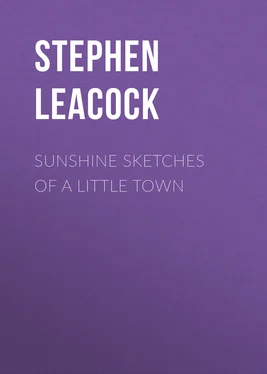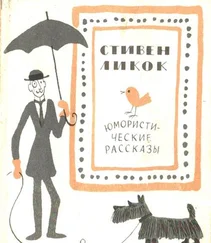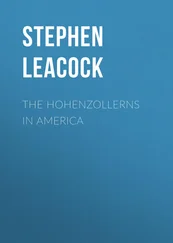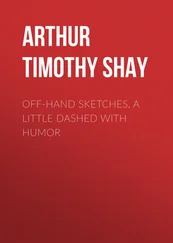Stephen Leacock - Sunshine Sketches of a Little Town
Здесь есть возможность читать онлайн «Stephen Leacock - Sunshine Sketches of a Little Town» — ознакомительный отрывок электронной книги совершенно бесплатно, а после прочтения отрывка купить полную версию. В некоторых случаях можно слушать аудио, скачать через торрент в формате fb2 и присутствует краткое содержание. Жанр: foreign_prose, foreign_antique, на английском языке. Описание произведения, (предисловие) а так же отзывы посетителей доступны на портале библиотеки ЛибКат.
- Название:Sunshine Sketches of a Little Town
- Автор:
- Жанр:
- Год:неизвестен
- ISBN:нет данных
- Рейтинг книги:4 / 5. Голосов: 1
-
Избранное:Добавить в избранное
- Отзывы:
-
Ваша оценка:
- 80
- 1
- 2
- 3
- 4
- 5
Sunshine Sketches of a Little Town: краткое содержание, описание и аннотация
Предлагаем к чтению аннотацию, описание, краткое содержание или предисловие (зависит от того, что написал сам автор книги «Sunshine Sketches of a Little Town»). Если вы не нашли необходимую информацию о книге — напишите в комментариях, мы постараемся отыскать её.
Sunshine Sketches of a Little Town — читать онлайн ознакомительный отрывок
Ниже представлен текст книги, разбитый по страницам. Система сохранения места последней прочитанной страницы, позволяет с удобством читать онлайн бесплатно книгу «Sunshine Sketches of a Little Town», без необходимости каждый раз заново искать на чём Вы остановились. Поставьте закладку, и сможете в любой момент перейти на страницу, на которой закончили чтение.
Интервал:
Закладка:
And then, finally, Mr. Diston persuaded Dean Drone to come, and as soon as Mr. Smith and Alphonse saw him they landed him with a fried flounder that even the apostles would have appreciated.
After that, every one knew that the license question was practically settled. The petition was all over the town. It was printed in duplicate at the Newspacket and you could see it lying on the counter of every shop in Mariposa. Some of the people signed it twenty or thirty times.
It was the right kind of document too. It began—"Whereas in the bounty of providence the earth putteth forth her luscious fruits and her vineyards for the delight and enjoyment of mankind—" It made you thirsty just to read it. Any man who read that petition over was wild to get to the Rats' Cooler.
When it was all signed up they had nearly three thousand names on it.
Then Nivens, the lawyer, and Mr. Gingham (as a provincial official) took it down to the county town, and by three o'clock that afternoon the news had gone out from the long distance telephone office that Smith's license was renewed for three years.
Rejoicings! Well, I should think so! Everybody was down wanting to shake hands with Mr. Smith. They told him that he had done more to boom Mariposa than any ten men in town. Some of them said he ought to run for the town council, and others wanted to make him the Conservative candidate for the next Dominion election. The caff was a mere babel of voices, and even the Rats' Cooler was almost floated away from its moorings.
And in the middle of it all, Mr. Smith found time to say to Billy, the desk clerk: "Take the cash registers out of the caff and the Rats' Cooler and start counting up the books."
And Billy said: "Will I write the letters for the palms and the tables and the stuff to go back?"
And Mr. Smith said: "Get 'em written right away."
So all evening the laughter and the chatter and the congratulations went on, and it wasn't till long after midnight that Mr. Smith was able to join Billy in the private room behind the "rotunda." Even when he did, there was a quiet and a dignity about his manner that had never been there before. I think it must have been the new halo of the Conservative candidacy that already radiated from his brow. It was, I imagine, at this very moment that Mr. Smith first realised that the hotel business formed the natural and proper threshold of the national legislature.
"Here's the account of the cash registers," said Billy.
"Let me see it," said Mr. Smith. And he studied the figures without a word.
"And here's the letters about the palms, and here's Alphonse up to yesterday—"
And then an amazing thing happened.
"Billy," said Mr. Smith, "tear'em up. I ain't going to do it. It ain't right and I won't do it. They got me the license for to keep the caff and I'm going to keep the caff. I don't need to close her. The bar's good for anything from forty to a hundred a day now, with the Rats' Cooler going good, and that caff will stay right here."
And stay it did.
There it stands, mind you, to this day. You've only to step round the corner of Smith's Hotel on the side street and read the sign: LADIES' AND GENT'S CAFE, just as large and as imposing as ever.
Mr. Smith said that he'd keep the caff, and when he saida thing he meant it!
Of course there were changes, small changes.
I don't say, mind you, that the fillet de beef that you get there now is perhaps quite up to the level of the filet de boeufs aux champignons of the days of glory.
No doubt the lamb chops in Smith's Caff are often very much the same, nowadays, as the lamb chops of the Mariposa House or the Continental.
Of course, things like Omelette aux Trufles practically died out when Alphonse went. And, naturally, the leaving of Alphonse was inevitable. No one knew just when he went, or why. But one morning he was gone. Mr. Smith said that "Alf had to go back to his folks in the old country."
So, too, when Alf left, the use of the French language, as such, fell off tremendously in the caff. Even now they use it to some extent. You can still get fillet de beef, and saucisson au juice, but Billy the desk clerk has considerable trouble with the spelling.
The Rats' Cooler, of course, closed down, or rather Mr. Smith closed it for repairs, and there is every likelihood that it will hardly open for three years. But the caff is there. They don't use the grills, because there's no need to, with the hotel kitchen so handy.
The "girl room," I may say, was never opened. Mr. Smith promised it, it is true, for the winter, and still talks of it. But somehow there's been a sort of feeling against it. Every one in town admits that every big hotel in the city has a "girl room" and that it must be all right. Still, there's a certain—well, you know how sensitive opinion is in a place like Mariposa.
TWO. The Speculations of Jefferson Thorpe
It was not until the mining boom, at the time when everybody went simply crazy over the Cobalt and Porcupine mines of the new silver country near the Hudson Bay, that Jefferson Thorpe reached what you might call public importance in Mariposa.
Of course everybody knew Jeff and his little barber shop that stood just across the street from Smith's Hotel. Everybody knew him and everybody got shaved there. From early morning, when the commercial travellers off the 6.30 express got shaved into the resemblance of human beings, there were always people going in and out of the barber shop.
Mullins, the manager of the Exchange Bank, took his morning shave from Jeff as a form of resuscitation, with enough wet towels laid on his face to stew him and with Jeff moving about in the steam, razor in hand, as grave as an operating surgeon.
Then, as I think I said, Mr. Smith came in every morning and there was a tremendous outpouring of Florida water and rums, essences and revivers and renovators, regardless of expense. What with Jeff's white coat and Mr. Smith's flowered waistcoat and the red geranium in the window and the Florida water and the double extract of hyacinth, the little shop seemed multi-coloured and luxurious enough for the annex of a Sultan's harem.
But what I mean is that, till the mining boom, Jefferson Thorpe never occupied a position of real prominence in Mariposa. You couldn't, for example, have compared him with a man like Golgotha Gingham, who, as undertaker, stood in a direct relation to life and death, or to Trelawney, the postmaster, who drew money from the Federal Government of Canada, and was regarded as virtually a member of the Dominion Cabinet.
Everybody knew Jeff and liked him, but the odd thing was that till he made money nobody took any stock in his ideas at all. It was only after he made the "clean up" that they came to see what a splendid fellow he was. "Level-headed" I think was the term; indeed in the speech of Mariposa, the highest form of endowment was to have the head set on horizontally as with a theodolite.
As I say, it was when Jeff made money that they saw how gifted he was, and when he lost it,—but still, there's no need to go into that. I believe it's something the same in other places too.
The barber shop, you will remember, stands across the street from Smith's Hotel, and stares at it face to face.
It is one of those wooden structures—I don't know whether you know them—with a false front that sticks up above its real height and gives it an air at once rectangular and imposing. It is a form of architecture much used in Mariposa and understood to be in keeping with the pretentious and artificial character of modern business. There is a red, white and blue post in front of the shop and the shop itself has a large square window out of proportion to its little flat face.
Painted on the panes of the window is the remains of a legend that once spelt BARBER SHOP, executed with the flourishes that prevailed in the golden age of sign painting in Mariposa. Through the window you can see the geraniums in the window shelf and behind them Jeff Thorpe with his little black scull cap on and his spectacles drooped upon his nose as he bends forward in the absorption of shaving.
Читать дальшеИнтервал:
Закладка:
Похожие книги на «Sunshine Sketches of a Little Town»
Представляем Вашему вниманию похожие книги на «Sunshine Sketches of a Little Town» списком для выбора. Мы отобрали схожую по названию и смыслу литературу в надежде предоставить читателям больше вариантов отыскать новые, интересные, ещё непрочитанные произведения.
Обсуждение, отзывы о книге «Sunshine Sketches of a Little Town» и просто собственные мнения читателей. Оставьте ваши комментарии, напишите, что Вы думаете о произведении, его смысле или главных героях. Укажите что конкретно понравилось, а что нет, и почему Вы так считаете.












